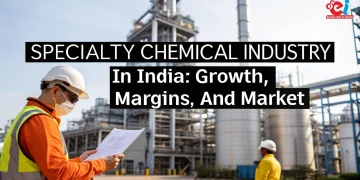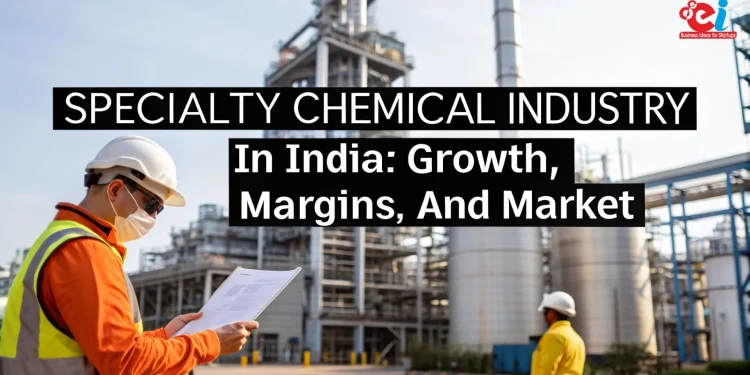One of the most promising sectors for new manufacturing startups in India is the specialty chemical industry. The India Specialty Chemicals Market Report estimated that in 2023, it was worth approximately USD 35 billion and will reach over USD 60 billion by 2028, experiencing a Compound Annual Growth Rate (CAGR) of 11%-12%. Moreover, with global supply chains diversifying post-COVID, there is increasing demand across agriculture; pharmaceuticals; textiles; personal care; and electronics which drives innovation as well as high margin opportunities within the sector.
What Are Specialty Chemical ?
Like all other chemicals, they play an important role in our daily lives by serving different functions. As such, these specialty chemicals are produced in smaller quanities than bulk/commodity chemicals due to having advanced polymers. Their main properties include co- additives and ingredients enabling complex chemical formulation. In simple words, specialty chemicals hold great promise along with numerous opportunities.
According to reports, the worldwide market for specialty chemicals is expected to exceed $1.2 trillion by 2030, with India projected to increase its share significantly because of production cost advantages and policy reforms.
Key Growth Drivers in India
Several factors are contributing to the positive outlook for specialty chemical manufacturing in India:
- Growing consumption in end-use sectors like FMCG, automotive, textiles, and electronics.
- Opportunities for higher exports because of changing geopolitics and tighter environmental regulations in China
- Government schemes supporting make-in-India initiatives and ease of doing business reforms.
- Establishment of chemical industrial parks and integrated manufacturing clusters.
- Skilled workforce available in engineering fields, especially in chemicals.
Related: How to Start Exporting Specialty Chemicals
Emerging Opportunities for New Startups
New entrepreneurs entering the specialty chemical field will find that some areas are widely successful and very profitable. These areas include:
- Agrochemical intermediates and technical grade actives.
- Additives for paints, coatings, and resins.
- Finishing of textiles and dye intermediate fragrances.
- Compounds for fragrances, flavors, and aromas.
- Ingredients for cosmetics and personal care products (e.g emollients or surfactants).
- Water treatment including construction chemicals.
- Specialized lubricants, plastic additives or other chemicals of a polymer nature.
- Materials in batteries and electronics grade chemicals.
What Every Entrepreneur Should Know About the Viability of a Startup
While there is a potentially advantageous margin in specialty chemicals, success centers on some particular startup fundamentals:
- Addressing hyper-specific market needs.
- Robust primary customer interviews supplementing preliminary market assessments.
- Production technology must be designed with growth potential.
- Raw materials sourced through backward integration.
- Compliance on Environment, Health & Safety (EHS) metrics from Day 1.
- Strong R&D under exclusive agreements with IP holders or licensors.
- Reliable utility provision (water, power, effluent treatment).
Related: Why should one step-in Specialty Chemicals Manufacturing Industry
Outline of the Manufacturing Process
Although each specialty chemical has its unique synthesis route every one follows the same general manufacturing flow:
- Reaction/Synthesis: Involving processes like chlorination, esterification, bromination as well as non-primary amines oxidation etc.
- Purification: Distillation followed by filtration and then either crystallization or solvent extraction.
- Drying /Milling: Reduction in moisture content or particle size to specified levels
- Blending/Formulation: Mixing with other additives or active ingredients.
- Quality Testing: Evaluating the product for its intended use and regulatory compliance.
- Packaging: Bulk or small units as per customer requirements.
For certain high-purity segments, process automation and cleanroom environments might be needed.
Infrastructure and Machinery Requirements
A specialty chemical unit for a specific product line may also include the following:
- Glass lined or stainless reactors
- Heat exchangers and condensers
- Scrubbers and fume extractors
- Centrifuges and filter presses
- Equipment for milling, drying, blending
- Effluent treatment systems
Cross-contamination control, raw material flow streamlining, fire safety standard adherence, among others depend on effective layout planning.
Regulatory Approvals and Compliance
Setting up a specialty chemical unit involves complex legal procedures alongside environmental clearances:
- SPCB NOC & Consent to Operate
- Factory License under Factories Act
- Hazardous Waste Management Registration
- Environmental Impact Assessment (EIA)
- Fire Safety Approval
- Building Safety Approval
- BIS/REACH exports certification
Depending on the category of chemicals, regulatory approvals can take from 6 to 12 months necessitating strategizing within the project timeline.
Access to Market Channels and Selling Strategies Combination
For selling specialty chemicals, domain-specific strategies are needed. Newer manufacturers are advised to:
- Strengthen their technical sales staff who specialize in certain application areas.
- Participate in B2B exhibitions like ChemExpo India, India Chem and other trade fairs focused on exporting.
- Formulate partnerships with toll manufacturers or formulation partners.
- Obtain quality certifications like ISO, GMP and HACCP for credibility purposes.
- Utilize online B2B portals alongside digital marketing for specialized promotion.
Trends and Innovations Shaping the Sector
- Green and bio-based chemicals – renewable feedstocks and biobased formulations
- Smart materials – thermally or optically responsive or otherwise reactive chemicals
- Microencapsulation for controlled release in agro-pharmaceuticals
- Circular chemistry by utilizing waste as feedstock e.g., CO₂ based chemicals
- Digital twins and AI in R&D for predicting molecules behavior enhances product development speed.
Key Challenges to Focus On
- Complex regulations that keep changing
- High costs of research including pilot plans
- Slow-moving approval processes from institutional buyers
- Shortage of skilled workers in remote regions
- Hazardous materials have high logistics costs
- Environmental sustainability, as well as community opposition, in certain areas
Conclusion
For Indian entrepreneurs, specialty chemical manufacturing offers tremendous promise and growth potential. By implementing a targeted approach including strategy-aligned tech-enabled production and a focus on sustainability, startups can build a profitable niche in this vibrant sector. Success hinges on thorough planning, comprehensive market research, and compliance preparedness.
How NPCS Can Help
Niir Project Consultancy Services (NPCS) prepares specialized chemicals market survey reports and detailed techno economic feasibility analysis reports providing multi-dimensional support to new ventures. Some parts of these documents are:
- Comprehensive processes for manufacturing
- Acquisition and transportation of raw materials
- Plant construction with machine optimal assembly for efficiency
- Financial modeling along with ROI calculations tailored to project needs
NPCS assists entrepreneurs in evaluating project viability while helping identify risks associated with the projects to make strategic decisions aimed at industrial success.


















